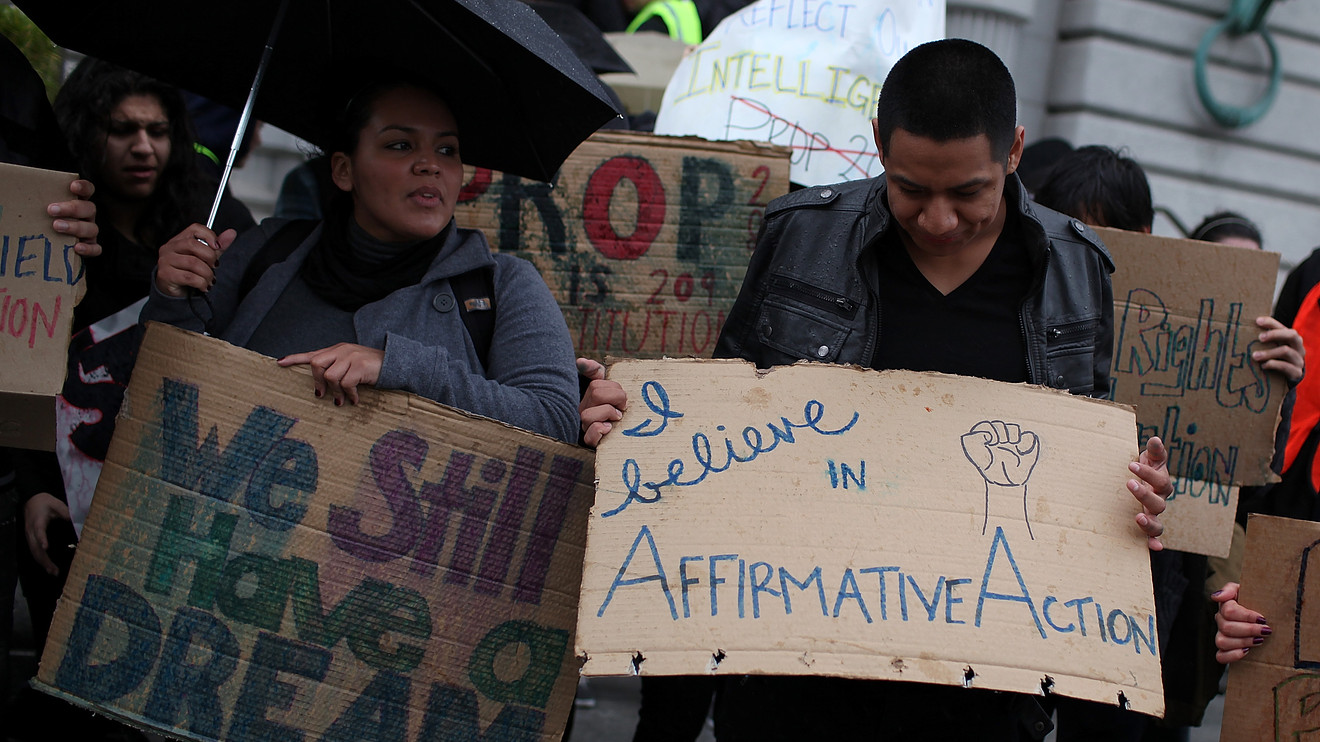
This election, California voters will be voting on a ballot measure that, if passed, would repeal a 1996 bill that prohibits affirmative action.
Known as the California Civil Rights Initiative, Prop 209 prohibited state-sanctioned institutions, like the University of California system, from considering race, sex, ethnicity in the areas of hiring, public education admission and public contracting.
In other words, it put in place “race-neutral” policies by eliminating the use of affirmative action, guidelines that are “intended to end and correct the effects of a specific form of discrimination,” according to the Oxford Handbook of Practical Ethics.
But many proponents for affirmative action argue that the term “race neutral” in regards to hiring and admissions is a misnomer meant to discriminate against women, people of color and other historically disenfranchised communities.
“The truth is: when you claim to be ‘race neutral’ or to ‘not see race’ you simply validate a status quo that is built on the oppression of people of color,” Los Angeles City Councilmember David Ryu said in a virtual press conference on Tuesday, Aug. 19.
The press conference, hosted by civil rights and legal organization Asian Americans Advancing Justice – LA, brought together a host of affirmative action advocates to encourage voters to vote yes on Prop 16.
Historically, the Asian and Pacific Islander (API) community has had a mixed relationship with affirmative action.
While many Asian Americans support affirmative action to redress historically systemic racism, many API groups oppose the guideline, pointing to the possible gutting of overall high acceptance rates among academically excellent Asian students, especially in the Ivy League and other prestigious college institutions,
The Trump administration, through the U.S. Department of Justice, threatened legal action against Yale University with the claim that affirmative action in its admissions discriminates against white and Asian students, as reported by the Asian Journal.
Additionally, critics of affirmative action fear that college admissions offices might utilize racial quotas in an attempt to satisfy diversity requirements.
But Ryu, who is Korean American, said that the attempt was “yet another pathetic attempt to drive a wedge between the AAPI community and other communities of color.”
The notion that affirmative action hurts the API community erases the real concerns that many Asian groups face when applying for college or jobs. The model minority myth that plays on the stereotype that the entire API community is generally well-off and high achieving is often a farce used to play up an assumed, and often false, adjacency to privilege and, by extension, whiteness, many of the speakers noted.
It ignores the plight of the thousands of API immigrants who still struggle to find employment, education or public programs due to their limited English skills and the lack of outreach among government agencies, employers and school admissions.
According to Advancing Justice-LA, the influx of Asian immigrants in the latter half of the 20th century led to the gradual increase of enrollment rate at prestigious colleges that do implement some form of affirmative action, welcoming a wider variety of Asian students than ever before.
Aquilina Soriano Versoza, executive director of the Pilipino Workers Center (PWC), pointed out the inequalities that APIs face in the white-collar workforce and that affirmative action helps to “address structural inequalities and discrimination faced by Asian Americans in the workplace.”
“These inequalities show themselves as lower eagles and a bamboo ceiling that Asian Americans hit when being considered for leadership positions,” Soriano Versoza said, noting that second-generation Asian Americans with college degrees still “fall behind their white counterparts in earrings” and “advancement beyond entry-level professional positions.”
According to the speakers on Tuesday, affirmative action also seeks to break the monolithic view of the API community by examining the sliding scale of discrimination based on specific cultures. For example, South Asian Americans, like Pakistani Americans and Bangladeshi Americans, face discrimination that Japanese Americans and Filipino Americans generally do not.
“The notion that affirmative action actively hurts South Asian Americans only serves to further entrench the model minority myth, that our communities are inherently more deserving or meritorious than Black, Latino and Indigenous communities,” said Mahnoor Hussain, policy and partnerships manager at South Asian Americans Leading Together.
Referencing the historic exclusion of Asian groups in the U.S., Hussain added that college admissions offices that utilize affirmative action serve as crucial solutions “to the centuries of discriminatory social mores and federal policies, including national origin-based immigration policies that have hindered certain Asian American immigrants while favoring others. We must stop allowing affirmative action to be criminalized – to do so is anti-Black and anti-immigrant and [it] undermines equity.”
Prop 16 was first introduced by California Assemblymembers Shirley Weber (D-San Diego), Mike Gipson (D-South Bay) and Miguel Santiago (D-Downtown LA) on Jan. 18, 2019.
In June of this year, the California Legislature passed Prop 16 with more than two-thirds of the vote in each house, which allowed the proposal to appear on the November ballot.
The support for Prop 16 extends beyond Democratic lawmakers. Professional sports teams in the Bay Area — including the Golden State Warriors, San Francisco 49ers, San Francisco Giants, Oakland Athletics, San Jose Sharks, San Jose Earthquakes and Oakland Roots — released a joint statement endorsing the ballot measure.
President of the Warriors Rick Welts wrote in a statement, “If we’re going to live up to our reputation as a golden state with golden opportunities, we can and should do more to remove systemic barriers that shut Californians from a shot at a better life.”
“Prop 16 is crucial to creating a stronger economic future for women, communities of color and greater economic prosperity for California as a whole.”
Most surprising of this endorsement is the 49ers, which four years ago received backlash for its failure to stand behind its former starting quarterback Colin Kaepernick after he was allegedly blackballed by the NFL after his then-controversial protest of racially-charged police brutality.
Al Guido, president of the 49ers wrote in a statement of endorsement, “The road to equality and equity has been long and exhausting for so many but our organization is determined to push for meaningful action in the direction of progress — supporting Prop 16 is a necessary step to break down systemic racial barriers and level the playing field for all Californians.”
He continued, “There is no doubt that a more inclusive California can and will be a stronger California, for all.”




